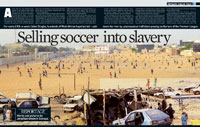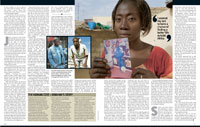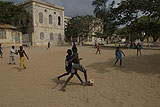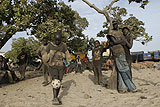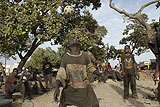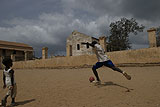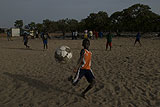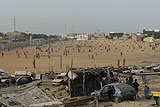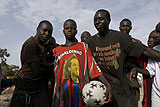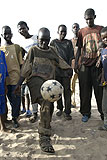» home » portfolio » reportage
Soccer Slavery
Anyone who saw Jumo Mendoza play football on the dustbowl fields would tell you the same: the boy was a born champion. His talent was extravagant. He could skip the tackles – you could chart his path to the goal by the boys sprawled in the red dirt behind him – turn on a sixpence, weave a shield around the ball with his left foot and finish like a star, with hard, dipping balls that curled into the top corner of the net. He would have played the same whether or not he knew about the sports agent on the touchline, licking his lips at the prospect of signing him.
Mendoza played his football on the tiny island of Gorée, just off the coast of Senegal in West Africa. He drew spectators into stands that are no more than crumbling adobe buildings: the very same huts that were once full of slaves – some 20 million passed through here – captured by French colonialists before being herded into slave ships, shackled and bound for the New World. Five million died because of ill treatment and inhuman conditions before they even made it. They say you learn from history, but an 18-year-old boy had too many hopes of future stardom to dwell on the past.
In the days that followed, the agent told Jumo that FC Porto in Portugal would like to sign him. Jumo dreamed of playing in the Premier League, the world’s greatest league; escaping the poverty of Africa, playing for a big European gateway club, following his feet to an air-conditioned penthouse in London or Manchester; buying his mother a house. Drogba, Diouf, Kamara… Mendoza. After four years in the Premier League, Vieira was seeing out his top-flight days on £80,000 a week. Why not him?
Jumo, a lean 5ft 10in with piercing brown eyes and an understated demeanour, thought his wildest dreams were about to be realised. The agent came to the house with four men and told his mother that Jumo was ‘perfect’. Linda Mendoza, who was raising five other children alone as a single mother, couldn’t believe it. ‘I wanted my son to have a chance of finding a better life outside Africa,’ she says, sitting on the floor of her modest home. ‘They told me that he would go to Europe and buy me a big house.’
But first she needed to come up with the money for plane tickets and other expenses. She sold all her jewellery. Her hands go up to her neck where a gold necklace that had been in her family for generations should have been. ‘I thought that the sacrifices were worth it,’ she says. But the money Linda raised still wasn’t enough. So she stopped paying rent on her house and instead gave the money to Jumo.
The day Jumo was to leave she threw a big party, proudly asking all her friends and neighbours. She killed all the family’s precious goats in his honour. She even had a gourd painted with FC Porto’s colours, which she hung in the living room. But today, instead of landing a six-figure contract with FC Porto, Jumo is homeless on the streets of Lisbon. He is stranded halfway between London and his home. ‘Now I have nothing,’ he sobs in a phone call to his mother in Senegal. ‘If I can’t beg money I starve.’ Worse, four months after he left, Linda was thrown out of her home by bailiffs.
I watch her bite her lip as she listens intently. Afterwards she tells me that Jumo broke down, saying, ‘I can’t believe you had to make all these sacrifices for me and now you are suffering.’
Jumo had been cynically exploited by the agent. He wasn’t booked on a flight to Lisbon. He was stranded at the airport for two days before his agent put him on a flight to Portugal for a trial with Santa Maria, a bottom-tier club. His place at Porto had been given to another boy who had paid the agent more money.
Jumo, undeterred, tried out for the club anyway but no accommodation had been organised so he slept in the park. Eventually, after two months, officials at the academy told him that he had to leave. All his paperwork had been taken by his agent. When he tried to call the agent there was no answer. He didn’t know anyone in Portugal and had no money. The only way to survive was to beg.
His mother Linda, her eyes moist and pricking with tears, says, ‘Jumo was so ashamed that he didn’t tell me what was happening. I only found out what really happened from other boys who had gone there as well.’
In her tiny living room, pictures of the Pope stare down from the walls. ‘Now I have nothing and nor does Jumo. The other children don’t go to school as we have no money to send them.’
Slipping a consoling arm around Linda is Jumo’s football coach, Omar Daittau. He spits in anger: ‘Buying and selling young boys like this is just another form of slavery.’
Sadly, Jumo is not alone. He and many like him are part of a vicious, cynical trade in teenagers from poverty-stricken areas in developing countries in Africa and South America, fuelled by demand from Europe’s richest clubs looking for cheap talent. The ultimate dream is to play at the pinnacle of the football pyramid: the English Premier League, where West African players like Chelsea’s Didier Drogba are reputed to earn up to £90,000 per week.
Those Premier League clubs routinely cherry-pick from the gateway clubs in Holland, Belgium and France, which are packed with African players. While EU laws stipulate that players must hold a work permit before they arrive, these countries apply the rules less stringently than the UK – all the more so in the case of boys from their former colonies in Africa. And with the Premier League the ultimate goal of these hopefuls, these clubs effectively keep the trade going as the biggest payers.
Agents pull off their scams in several ways. They tell the boys clubs are interested in them when they are not, flying out large numbers for trials in the hope that one of them will strike it lucky. They take away their passports so that other agents can’t fly them out of the country. And when the boys fail the trials they refuse to pay their fare home. They do the dirty work for European clubs who do not want to sully their hands trading in young African boys.
When Sepp Blatter, head of Fifa,
the International Federation of Association Football, finally touched
on the hitherto taboo subject, he did
so with force, accusing European richest clubs of ‘despicable’ behaviour and being engaged in ‘social and
economic rape’.
What is especially poignant is that the guilty parties routinely turn for plunder to their former colonies, the very places where once they ran slave stations. So the French target old colonial outposts in places such as Senegal, while Spain and Portugal look to South America.
Says Moussa Ndiaye of the Senegalese Football Association, ‘The boys are cheap compared to European players. It is always worth sending 100 – the agent can make money from the one or two who make it. The other 98 are forgotten.’
With such huge sums to be made, the traffickers threaten to kill anyone who gets in their way. Jean-Marie Dedecker, a senator in the Belgian parliament, has investigated 442 cases of illegal trade with Nigerian players in Belgium alone.
‘I was warned that if I went to Nigeria to investigate this I would be killed,’ he says. ‘In Nigeria, the people bringing in football players also bring in prostitutes. I believe that many are also involved in smuggling drugs.’
Corrupt interests with big money allow the black market to function, Dedecker says. ‘Everyone is involved. Agents, clubs – even politicians who don’t want to criticise football as they sit in hospitality boxes at games. Nobody is interested in tackling the problem. They all turn a blind eye.’
A drive through Dakar is not a romantic affair. The air is thick with the sickly stench of garbage rotting on pavements in the wilting sub-Saharan heat. A choking, terracotta dust invades the lungs. In the south, a nasty rebel insurgency simmers and scores are killed every day. Two-thirds of the people live on less than £1 a day; half have no access to proper sanitation; life expectancy is around the mid-fifties. There are no lush safaris to draw wealthy tourists nor are there natural resources such as gold, diamonds or oil. The country is pancake-flat, parched savannah. The one hope for young people here is football.
Every night in the paling light of dusk at around 5pm the country goes football-crazy. Every patch of dusty ground becomes a makeshift pitch – junkyards, sidings and car-packed streets.
In 2002, Senegal beat their former slavemasters, France, in the opening round of the World Cup finals. Dakar was a riot of jubilation as street parties carried on long into the night. It was the surprise match of the tournament and put Senegal on the footballing map. The victory, however, also brought the jackals out; unscrupulous agents out to make a fast buck by trafficking young boys.
Jumo’s former coach, Daittau, runs the Ramon Foot and Physics football academy. It operates out of a dusty patch of ground, surrounded by graffiti-scrawled concrete walls. A strong stench of urine wafts over players when the wind changes.
‘I run the club to get boys off the streets,’ he says. ‘But now many children skip school. Their parents encourage them. Everyone thinks they are going to get rich playing football. Look at the wages in the Premier League – the cars, the houses, the lifestyles. It’s heartbreaking. Everyone is trying to get rich. I lent a boy to another trainer. He tried to sell him to a club. The agents come all the time and I tell them to go away. It never stops.’
On Gorée Island, 13-year-old Assan proudly wears his Frank Lampard shirt. Where they used to pick slaves for the plantations of America and the Caribbean, they now pick sides for games of football. ‘My parents want me to be a footballer,’ says Assan. ‘They want me to become a professional.’
But you don’t have to go far to find the misery that this modern-day slave trade causes. Sitting nearby in the shade of a baobab tree is Ibrahaim Ndione, 23, who was born on the island. An unscrupulous agent, who claimed the French-Corsican club Ajaccio was interested in signing him, swept him up. When he arrived in Corsica no one knew anything about him. He was then flown to Monaco where Monaco FC was interested in hiring him. ‘But my agent started asking for huge sums of money,’ he says. ‘The club said, “Your agent wants too much.”’ The deal fell through and Ibrahaim flew home broke and dejected.
When they fail to make the grade the boys are tossed aside like rubbish. One such youngster is Ibrahim N’Diaye, who sleeps on the street in Paris foraging from dustbins and washing in public toilets (see box).
Unsurprisingly, finding agents among the shadowy nexus of contacts in the Dakar underworld is difficult. My guide and I are given the name of an agent called Ahmad. After a series of failed meetings we track down one of his assistants. In the darkened houses around his home, people live in squalor with dirty curtains for doors. But he lives like a king. A flatscreen Hitachi TV stands in the living room, a brand-new DVD player under it. Expensive children’s clothes are strewn over his bed. ‘We help these boys sell their talents,’ he says proudly, before agreeing to pass on a message to Ahmad.
Several hours later Ahmad calls and agrees to a meeting in the wealthy district of Point E. He arrives towering over the traffic in a 4x4 before stepping out wearing a neatly tailored black suit over a white T-shirt. He looks incongruous among the other passers-by dressed in tatty clothes and barefoot. By his side is a hulk of a man with arms like tree trunks, his triceps straining against the cheap cotton of his shirt. This is his bodyguard. Clearly, Ahmad has something to fear from the people and families he has exploited.
‘Every footballer in Senegal knows me,’ he boasts proudly. ‘Even the president knows me. Ask him about Ahmad – he knows my name.’
Ahmad estimates that he has sent at least 5,000 boys to Europe and the Middle East. ‘I feel proud about what I have done,’ he says. Just this week, he claims, he has taken 100 calls from boys desperate to get to Europe. ‘My phone rings constantly. There is not one single African boy who does not want to go. If they opened all the doors there would be no Africans left here.’ Ahmad says he travels from the Ivory Coast to Mali and Ghana in the hunt for new talent.
But then he makes an extraordinary admission. ‘We Africans have an evil inside us, you know,’ he says, widening his eyes and leaning over the table towards me. ‘We all want money. In my business there is no friendship. It is only business. We select the best. The rest don’t make it.’
He sounds ominously like an 18th century slaver. It was, after all, Africans who were paid by the French to capture slaves in the interior of the country.
He says around 50 per cent of the boys don’t make it but one suspects the number is far higher. ‘There are many agents who are really bad,’ he says. ‘They just send them and leave them there. But I don’t want to hurt anybody.’
Some 150 years ago the slave trade ruined Africa because people here had no chance of building cities or developing – all the young men had been shipped to the New World. The same seems to be happening today.
To rectify this, plans are under way at the Senegalese Football Association to start a professional league in a bid to stop all the best players leaving the country. But head of training Moussa Ndiaye throws up his hands despondently when I ask how he will pay the players. ‘We have no money,’ he shrugs.
‘All these boys come from very deprived backgrounds and believe anything they are told,’ he says. ‘They think all their problems will be solved if they leave Africa.’
The future looks bleak while young men in Senegal believe that the only hope for education, food and a safe life in Africa lies with their quixotic dreams of soccer stardom. Back in Lisbon, wondering where his next meal is coming from, is Jumo.
‘You know,’ he tells me over the phone, breaking down in tears, ‘all I wanted to do was to play football. And now look – that foolish dream has ruined my life and the lives of my family.’
